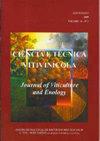Response of grapevine cv. ‘Brancellao’ and ‘Sousón’ to supplementary irrigation: Water relations, vine growth, yield and berry and wine composition
IF 0.9
4区 农林科学
Q4 FOOD SCIENCE & TECHNOLOGY
引用次数: 2
Abstract
Growers are concerned about the negative impacts on vine yield and berry quality caused by global warming. Irrigation systems are increasingly being installed in vineyards in order to counteract those problems. Therefore, an efficient irrigation management is required. In this context, a field experiment was carried out over three years (2012-2014) on red Vitis vinifera (L.) cv. ‘Brancellao’ and ‘Souson’ in order to assess the effects of supplementary irrigation on vine performance and must and wine composition. Rain-fed vines were compared with a treatment irrigated to 40% of potential evapotranspiration (ET0) from bloom to two/three weeks before harvest. Both cultivars showed less negative stem water potentials under irrigation than under rain-fed conditions; however, stomatal conductance was similar between treatments. Yield was unaffected by irrigation, whereas pruning weight tended to increase in both cultivars. Must and wine composition, including amino acids and volatile compound concentrations, were mostly unaffected by irrigation. Water productivity was higher under rain-fed conditions and, as a consequence, gross incomes were not increased by irrigation. Therefore, irrigation does not seem an economically viable agricultural practice under the conditions of this trial.葡萄对cv的响应。“Brancellao”和“Sousón”补充灌溉:水关系、葡萄生长、产量、浆果和葡萄酒成分
种植者担心全球变暖会对葡萄产量和浆果质量造成负面影响。灌溉系统越来越多地安装在葡萄园,以解决这些问题。因此,需要有效的灌溉管理。在此背景下,对红葡萄(Vitis vinifera, L.) cv进行了为期三年(2012-2014)的田间试验。“Brancellao”和“Souson”,以评估补充灌溉对葡萄藤性能和葡萄汁和葡萄酒成分的影响。将雨养葡萄藤与从开花到收获前2 / 3周灌溉40%潜在蒸散量(ET0)的处理进行比较。两个品种在灌溉条件下的茎负水势均小于雨养条件下;然而,不同处理间气孔导度相似。灌水对产量没有影响,但两个品种的剪枝重量都有增加的趋势。甜酒和葡萄酒的成分,包括氨基酸和挥发性化合物浓度,基本上不受灌溉的影响。在雨养条件下,水的生产力较高,因此,灌溉并没有增加总收入。因此,在本试验条件下,灌溉似乎不是一种经济上可行的农业做法。
本文章由计算机程序翻译,如有差异,请以英文原文为准。
求助全文
约1分钟内获得全文
求助全文
来源期刊

Ciencia E Tecnica Vitivinicola
Agricultural and Biological Sciences-Food Science
自引率
12.50%
发文量
5
期刊介绍:
Ciência e Técnica Vitivinícola (Journal of Viticulture and Enology) is an international journal that publishes original articles, research notes and review articles, written in Portuguese or in English, on the various fields of the science and technology of vine and wine: Viticulture, Enology and Vitivinicultural economy.
 求助内容:
求助内容: 应助结果提醒方式:
应助结果提醒方式:


